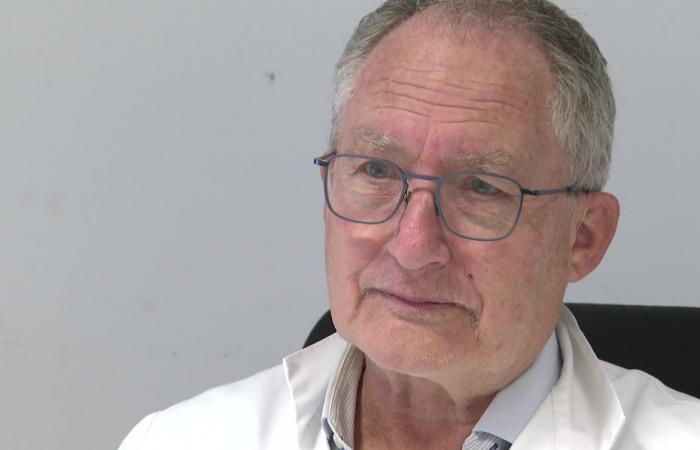The island does not have consolidated figures for people suffering from this disease or being monitored for cognitive decline. The regional health agency counted, as of December 31, 2022, 2,938 people affected, while the France Alzheimer Foundation puts the figure at 9,000. Nationwide, 900,000 people are diagnosed with Alzheimer’s disease or another related illness.
The main cause of dementia, this neurological condition results from a slow degeneration of neurons. It begins in the hippocampus and then spreads to the rest of the brain. It is characterized by disorders of recent memory, executive functions and orientation in time and space.
Doctor Patrick Mais performs a balance examination on a patient.
•
© Marion Fiamma / FTV
Don’t stop with drug treatments
The exercises completed, the patient returns to her seat, near her son, and awaits the geriatrician’s analysis. “The evolution is very very gentle and it will last a while like this”, believes Patrick Mallais.
In order to best support these patients, the Corsican Neuroevolutionary Diseases association, of which Doctor Mallais is president, was created. “The treatment of an elderly person suffering from cognitive disorders does not stop with drug treatments, but continues with an organization of stimulation and support on dimensions which are more social”, he explains.
Stimulation which can involve participation in workshops or the creation of aid and support for caregivers. “With caregivers, we work in such a way that they do not become exhausted until as late as possible”, specifies the geriatrician.
“We have our foot on the brake pedal”
Implementations that aim to delay the development of neurological conditions. “We have our foot on the brake pedal. That is to say that we do everything so that things slow down as much as possible and that the evolution is as gentle as possible, adds Doctor Mais. But of course, it is extremely difficult and we have patients who unfortunately progress quickly, despite the treatments we put in place.”
In some cases, entry into a retirement home becomes inevitable. “It happens all the time to tell people that they can no longer keep their loved one at home. It’s up to us to say it. And I would even say that it is up to us to anticipate it, that is to say, to see that the person declines, how quickly they decline. Which means that in a year or two, she will no longer be able to be at home and tell the loved one to start completing files for institutionalization.”
-The absence of a “old age” law
Structures that the geriatrician knows well. Between 2000 and 2011, he worked in particular as medical director of the health branch of the Orpea group, manager of nursing homes and clinics.
The private group was at the heart of a scandal, in 2022, after the publication of the investigative book by Victor Castanet, “Les Fossoyeurs”, which denounced mistreatment of residents, abusive use of public funds and shortcomings in the management of its staff.
© BERTRAND GUAY / AFP
A book in which Doctor Patrick MAIS is one of the main witnesses. “When I was a whistleblower, it was extremely difficult. It was a very complicated moment in my professional career, it’s very complicated. Unfortunately, I think that the basic problems remain because the old age law, which is the necessary law, has still not been brought up to standard, as we would have liked..”
“The nursing homes do not have enough resources”
Instead of the long-awaited “old age” law, Parliament definitively adopted, last March, the “aging well” law. A text deemed insufficient for the autonomy sector, still deprived of a financial programming law on old age despite being promised by the President of the Republic at the start of his first five-year term.
A problem that inevitably affects island establishments. “I advocate the fact that nursing homes do not have enough resources, continues Patrick Mais. But the structures that I know in Corsica are nursing homes in which the teams who work there do a wonderful job. It’s support and monitoring work, which is very well done.”
This testimony can be found, this Friday, January 24 at 8:40 p.m., on France 3 Corse ViaStella in a new issue of Sucetà magazine dedicated to Alzheimer’s disease.






